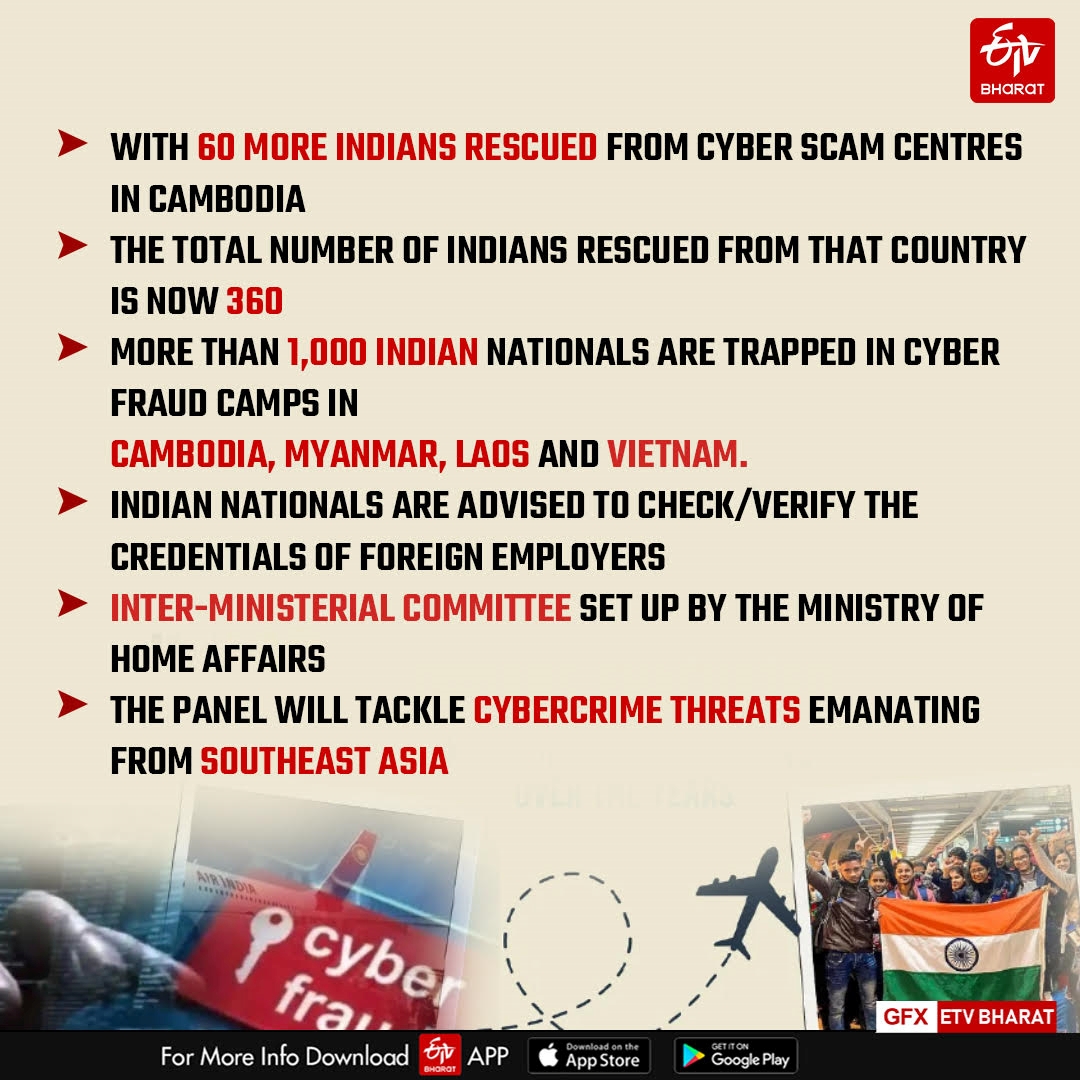New Delhi: With 60 more Indians rescued from cyber scam centres in Cambodia, the total number of Indians rescued from that country is now 360. But the fact of the matter is there are more than 1,000 Indian nationals trapped in cyber fraud camps not only in Cambodia, but also in other Southeast Asian nations like Myanmar, Laos and Vietnam.
In fact, when one opens the website of the Indian Embassy in Cambodia, an advisory pops up cautioning Indian nationals intending to visit that country for employment to do so only through authorised agents. Indian missions in other Southeast Asian nations have also issued similar advisories.
So, what do these advisories state?
“It is advised that the background of the prospective employer in Cambodia is checked thoroughly,” the advisory issued by the Indian Embassy in Cambodia states. “Indian nationals are also advised not to indulge in practices contrary to the purpose for which the visa is granted by the host government, such as seeking employment on a tourist visa.”

A similar advisory being run on the website of the Indian Embassy in Laos states that Indian nationals are being lured for employment through Thailand to that neighbouring Southeast Asian nation.
“These fake jobs are for posts such as ‘Digital Sales and Marketing Executives’ or ‘Customer Support Service’ by dubious companies involved in call centre scams and crypto-currency fraud in Golden Triangle Special Economic Zone in Laos,” the advisory clearly states. “Agents in places such as Dubai, Bangkok, Singapore and India associated with these firms are recruiting Indian nationals by taking a simple interview and the typing test, and are offering high salaries, hotel bookings, along with return air tickets and visa facilitation. Victims are illegally taken across the border into Laos from Thailand and held captive to work in the Golden Triangle Special Economic Zone in Laos under harsh and restrictive conditions. At times, they are taken hostage by criminal syndicates indulging in illegal activities and forced to work in strenuous conditions under constant physical and mental torture.”
According to the advisory being run by the Indian Embassy in Vientiane, Indian workers have been brought to Laos to work in other regions of the country in low-cost jobs such as mining and wood factories and in most cases their handlers exploit them and endanger them in illegal work.
Stating that several Indians have been rescued under very difficult circumstances, the advisory adds: “Visa on arrival in Thailand or Laos does not permit employment and the Lao authorities do not issue work permits to Indian nationals coming to Laos on such visas. It may be noted that a tourist visa is to be used only for tourism.”
In the advisory that it has been running on its website since September last year, the Indian Embassy in Myanmar states that international crime syndicates are offering jobs in India’s civil unrest-torn eastern neighbour through various companies. Such syndicates are operating in areas like Myawaddy, Yangon, Laukkaing, Lashio and Tachileik.
“Recently, the Government of Myanmar has notified severe punishment for individuals indulging in online scamming, money laundering and human trafficking in accordance with the Myanmar laws,” it states.
The advisory cautioned Indian nationals not to get trapped in such job offers through social media platforms or other unverified sources.
“Indian nationals are advised to check/verify credentials of foreign employers through the missions concerned abroad and the antecedents of recruiting agents as well as the companies should be established before taking up any job offer abroad,” it states.
Meanwhile, following the rescue of the 60 Indian nationals earlier this week, the Indian Embassy in Phnom Penh stated that Indian nationals have been advised not to undertake illegal cybercrimes and to reach out to the Embassy and Cambodian hotline numbers. In fact, all the advisories issued by the Indian missions share helpline numbers for Indian nationals falling into such traps.
So, why are Indians falling into this trap and what is the modus operandi of these fraud employers running call centre scams?
As the advisory issued by the Indian Embassy in Laos states, agents in places such as Dubai, Bangkok, Singapore and India associated with these firms are recruiting Indian nationals by taking a simple interview and the typing test, and are offering high salaries, hotel bookings along with return air tickets and visa facilitation.
“The Government of India did what it had to do,” Pavan Duggal, advocate in the Supreme Court and cyber law expert, told ETV Bharat. “But people are complacent (meaning people don’t check the websites of the Indian missions in the countries where they are going to).” He said that he calls this phenomenon the new cyber world order.
“This is the order where cybercrime will be a daily life companion,” Duggal explained. “Cyber security breaches will be the new normal. We must take utmost care and caution or otherwise you will become a victim of cybercrime.”
According to Amol Kulkarni, Director (Research) in the CUTS International think tank and a specialist on digital economy and cyber security, Indians getting lured to Southeast Asia for jobs in fraud call centres is also because of a lack of job and income generation opportunities in India.
“There is also the attraction of a good life in Southeast Asia,” Kulkarni told ETV Bharat. He said that Indians are typically employed as data entry operators in these countries.
“They employ Indians proficient in regional Indian dialects and are made to engage with people in their respective regions in India,” Kulkarni explained. “That way, they can sweet talk into conning people of those regions. The Indian employees don’t even get to know how the data is being misused.”
He said that Indian nationals, once taken into the country where such fraud call centres operate, are trained and given salaries for the first few months.
“The salaries range from $700 to $800 per month,” Kulkarni said. “But after that, they are not allowed to leave. Their passports are seized by the employers and the recruiting agents disappear. Their employers demand exorbitant amounts of money to release them.”
He further stated that the scamsters invest in stocks and draw the confidence of Indian internet users. Though such users initially get some returns, once they decide to invest a substantial amount, access to their accounts is blocked.
So, how can this problem be tackled?
According to the Indian Cyber Crime Coordination Centre (I4C), a high-level inter-ministerial committee has been constituted by the Ministry of Home Affairs to tackle cybercrime threats emanating from Southeast Asia. The committee will coordinate with relevant ministries like the Ministry of External Affairs and other entities like social media intermediaries and law enforcement agencies.
According to Duggal, this is a good step in the right direction. “You can move forward in a cogent manner,” he said. “This will help identify the loopholes that exist in the system and plug these. Cybercrime is a global phenomenon and international cooperation is needed to deal with this threat.”
However, according to Kulkarni, although I4C has made such an announcement, the committee will, at the end of it all, have to depend on the local investigating authorities in those countries.
“The first priority is to get the Indian victims out of those countries,” he said. “The other most important thing is to identify the scamsters. This is a new form of human trafficking.”
The other priority is to recover the money lost by the Indian internet users. For that, Kulkarni said that awareness needs to be created among people.
“The Reserve Bank of India (RBI) has released a very useful handbook called ‘Be Aware’ and a document called ‘Zero Liability Framework,” he explained. “If the consumer complains within a reasonable timeframe, the financial service provider is liable to compensate. Banks and pay wallets should have enough systems in place to identify suspicious transactions. The RBI is not at all liable in such cases.”
Read more: Government Issues Instructions To Block Thousands Of Mobile Phones To Curb Cyber Fraud



